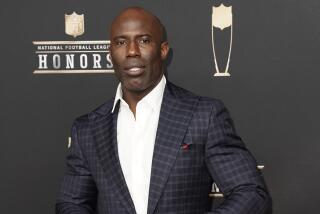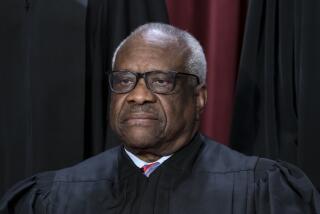Sununu Apologizes for Breaking Travel Rules : White House: He admits ‘mistakes were made.’ His requests for business jets may violate law, attorneys say.
WASHINGTON — White House Chief of Staff John H. Sununu rendered a cautious apology Saturday for his apparent violation of White House guidelines in soliciting the use of corporate aircraft, saying that “obviously some mistakes were made.”
His apology came as lawyers familiar with federal ethics statutes suggested that Sununu’s solicitation of the flights may have violated federal law as well as the White House guidelines. While a White House official defended Sununu’s actions as legal, congressional drafters of the 1989 Ethics Reform Act said that the statute was written broadly in order to prevent federal officials from soliciting anything of value from private citizens who may do business with the U.S. government.
“I tell my clients: ‘Don’t do it,’ ” said one prominent Washington ethics attorney. “I will not let them pick up the telephone and solicit a corporate carrier. . . . The statute plainly was intended to prohibit private parties from being pressured by public officials.”
For his part, Sununu issued a statement expressing regret that his actions had created the “appearance of impropriety” and acknowledging, as The Times reported in Saturday editions, that the White House was taking new steps to make sure “that no further problems of this nature arise.”
“Obviously some mistakes were made,” Sununu said. He added: “Certainly I regret that my own mistakes contributed to this controversy.”
Sununu’s own aides declined to comment Saturday on whether the law had been violated. One said that the question of illegality would have to be answered by White House counsel C. Boyden Gray. “I’m not going to get into it,” he said.
According to White House officials, Sununu personally telephoned Washington real estate developer Stuart Bernstein on June 10 and asked that Bernstein supply a plane to fly Sununu to a political event in Chicago.
Bernstein then provided Sununu with a plane owned by three other Washington businessmen--one of them a well-known federal contractor--and the chief of staff accepted the flight, against the advice of Gray.
The 1989 Ethics Reform Act, which was enacted with the support of President Bush, states that no federal employee shall “solicit or accept anything of value from a person seeking official action from, doing business with, or conducting activities regulated by the individual’s employing agency, or whose interests may be substantially affected by the performance . . . of the individual’s official duties.”
Congressional staffers who drafted this statute said that Sununu’s actions appear to have violated that provision of the law as well as a set of White House regulations issued to implement the law.
Under federal law, officials are permitted to accept rides on corporate aircraft for political or business trips provided that they do not solicit the trips themselves. In the case of political travel, the corporations must receive some reimbursement.
The most recent White House regulations, issued May 9, limited Sununu’s frequent use of military aircraft and also clearly ruled out soliciting private air transportation, some White House officials said.
Officials said that in trying to restrict Sununu’s use of corporate travel to adhere to federal law, Gray rejected requests to permit Sununu to fly on jets owned by Archer-Daniels-Midland Co., Textron Inc. and Ameritech. All three firms either have federal contracts or depend heavily upon federal policy.
It was not until after Gray had rejected those three names that Sununu personally telephoned Bernstein, who then paid $3,900 to lease a plane owned by Howard and Morton Bender and John Morton. Howard Bender’s company, Blake Construction Co., builds and leases buildings for the federal government.
Bernstein was reimbursed for $1,844 of the flight’s cost by the Republican Governors’ Assn., which sponsored the event attended by Sununu. The real estate developer paid the rest of the cost out of his own pocket, saying that he would report it as a contribution to the GOP.
Although Bernstein paid for the plane, White House officials said that Sununu mistakenly told the White House counsel that he was obtaining the aircraft from the Benders and John Morton.
In addition, they said, Sununu also misidentified Morton Bender as “Martin” and erroneously stated that the three men lived in Chicago, rather than Washington.
All the errors apparently made it more difficult for the White House counsel’s office to check for any potential conflict of interest. But officials said that Gray advised Sununu against flying on the plane because, as one official put it, “it looks bad.”
Bender figured prominently in a 1988 independent counsel’s investigation of then-Atty. Gen. Edwin Meese III’s personal finances. He also is a director of the now-defunct Madison National Bank, which is being investigated by the federal government.
Even though Gray tried to discourage Sununu from flying on the plane, one White House official said Saturday he doubted that Sununu had violated the law because the aircraft was being leased by Bernstein, who he said appears to have no business with the federal government.
The offers by the Benders and Morton, he added, “actually would have been OK because the kinds of contracts they have with the government would never reach Sununu.”
However, outside experts questioned Saturday whether the law could be interpreted that narrowly, and they noted that the White House chief of staff has decision-making power over a broad array of government functions.
The White House official described Bernstein as “a major political wheeler-and-dealer” and a big contributor to the Republican Party.
Meanwhile, Sununu and his wife, Nancy, spent the afternoon Saturday at a picnic at Camp David, Md., with President and Mrs. Bush and others. He made the approximately 60-mile trip using either his own car or a chauffeured automobile from the White House, an aide said.
One White House official suggested that Sununu’s handling of the Chicago flight brought home to Gray the difficulty of monitoring the chief of staff’s travel without demanding precise, documented information.
“From Boyden’s point of view, when someone gives you information, why should you doubt it, coming from the chief of staff?” the official said. But he said that Gray’s attitude is changing as a result of recent events. “It’s a learning experience,” the official added.
Under a new procedure spelled out by Gray on Friday, Sununu’s office will be required to tell Paul Bateman, director of the White House office of administration, whenever the chief of staff wants to travel by corporate aircraft.
Bateman will then turn to sponsors of the political event Sununu is attending and ask them if they can provide the transportation. Gray will then review the options, and Sununu will be informed after the arrangements are made.
Officials said that the new system is intended to prevent Sununu from playing any role in the solicitation of the ride. “It cuts him out of the loop,” one official said.
More to Read
Sign up for Essential California
The most important California stories and recommendations in your inbox every morning.
You may occasionally receive promotional content from the Los Angeles Times.









